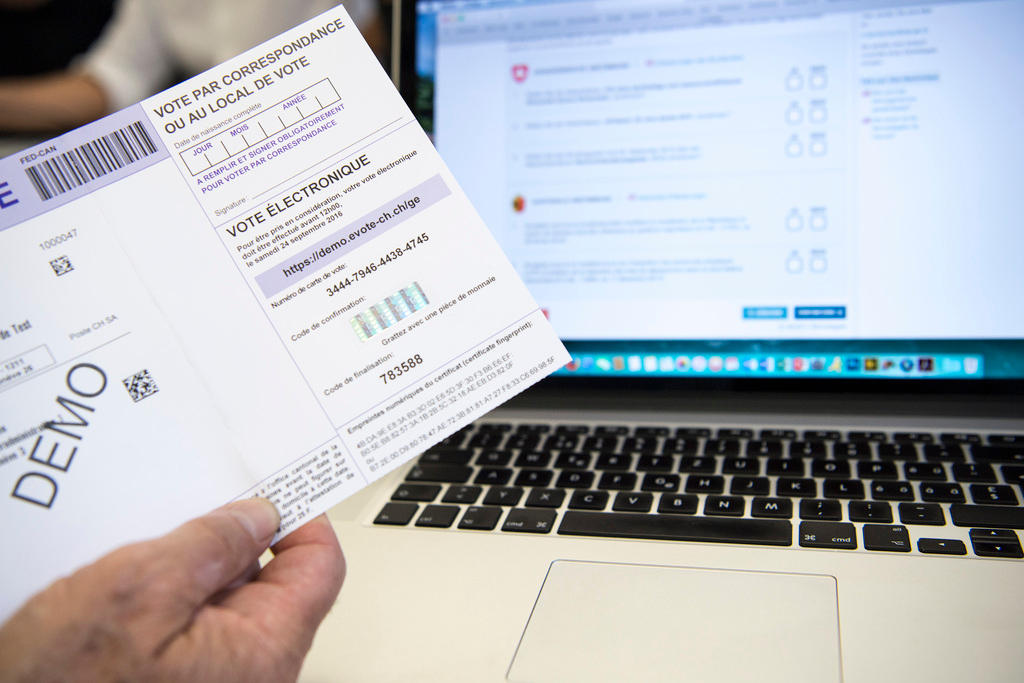
Geneva mounts e-voting charm offensive

As competition heats up, the Geneva cantonal government has launched an e-voting promotional campaign in a bid to win additional partners and clients for its system of electronic voting.
Currently, only six of Switzerland’s 26 cantons offer remote online voting to a limited number of their citizens. The long-term trials with e-voting suffered a severe setback last year after the Swiss government stopped the use of an American system on security grounds.
Since then, there has been a head-to-head contest between two technologies licensed by the national authorities: a home-grown e-voting system, developed by the authorities of canton Geneva, and Swiss Post, which cooperates with the private Spanish company Scytl.
For the time being, Geneva shares its software technology with three other cantons, while Swiss Post has at least two cantons on board. It is also known that at least three additional cantons have declared an interest in introducing e-voting.
Pierre Maudet, head of the Geneva cantonal security and economics department, made no secret that he was on a “charm offensive” in the Swiss capital, Bern, on Monday.
Boosted by a CHF4.7 million ($4.8 million) credit from the cantonal parliament to develop an additional security level for the system, the Geneva authorities invited Swiss parliamentarians, representatives from other cantons and the media for a presentation.
Security, transparency
Maudet and Geneva’s chancellor Anja Wyden Guelpa argued that their system has numerous benefits.

“We offer the best available security standard,” said Wyden Guelpa, “our system is 100% public and 100% Swiss,” she added.
Part of their pitch was also the guaranteed transparency of the system, an effort to make voting easier for visually impaired voters – via the use of a tablet version – , and Geneva’s pioneering role as a promoter of e-voting with a successful 13-year experience.
Maudet highlighted a project to introduce so-called “universal verification” by the end of 2018 – allowing a maximum transparency about the voting procedure. Geneva also plans to gradually introduce an Open Source system.
“A high degree of transparency might help discourage hackers from breaking into the system,” said Wyden Guelpa. At stake is not only confidence in the authorities but Switzerland’s reputation as a democracy, she added.
“Not least because there are votes at local, cantonal and nationwide levels up to six times a year beside the elections,” the chancellor said.
However, there always remains a risk despite all security precautions, Wyden Guelpa said. She pointed out that it is a fact that the current ballot box voting system is not fool proof.
The federal authorities officially launched their e-voting project in 2000. The trials include registered members of Swiss Abroad and a small group of domestic voters.
Canton Geneva was the first to offer e-voting to a limited number of its citizens in 2003. By 2015, 13 of Switzerland’s 26 cantons had introduced an online system ahead of the parliamentary elections.
But the government stopped the further use of an US software technology last August, leaving only two licensed systems.
The Federal Chancellery says it is not realistic to expect all cantons to be able to offer e-voting for the next parliamentary elections in 2019, despite earlier pledges.
There are reports of keen voters offering to fill in the ballot sheets of several other citizens before sending in the papers by post to the local authorities. Rumour also has it that irregularities occur during vote counting in different regions of the country.
Low-key
The Geneva officials stressed that their ambitions are modest and that they are fighting an all-powerful competitor with primarily commercial interests and much more financial means at its disposal.
“We don’t have anything to sell. We are interested in sharing our technology with others,” Wyden Guelpa said.
She acknowledged that it made sense for Geneva to win over more cantons to participate in development costs.
Unwilling to reveal financial details of an offer for an e-vote solution, the Geneva officials remained vague about figures. Much depends on the size of the order with the costs based on a fixed and a flexible component, according to Eric Favre, director of canton Geneva’s IT services.
Maudet was reluctant to set a clear target for Geneva to win additional partners. “We take small steps. Maybe three, four or five additional cantons.”
He said due to the difficult situation of public finances it has become more difficult for cantons to invest in e-voting.
But he argued that it could pay off for a canton to offer a remote online voting system. Not only for its citizens living outside Switzerland – registered Swiss citizens living abroad have the right to vote – but also because paperless e-voting, once introduced on a broad basis, will be less costly and quicker than the conventional system.

In compliance with the JTI standards
More: SWI swissinfo.ch certified by the Journalism Trust Initiative
















![The four-metre-long painting "Sonntag der Bergbauern" [Sunday of the Mountain Farmers, 1923-24/26] had to be removed by a crane from the German Chancellery in Berlin for the exhibition in Bern.](https://www.swissinfo.ch/content/wp-content/uploads/sites/13/2025/12/01_Pressebild_KirchnerxKirchner.jpg?ver=917ecbf2)















You can find an overview of ongoing debates with our journalists here . Please join us!
If you want to start a conversation about a topic raised in this article or want to report factual errors, email us at english@swissinfo.ch.